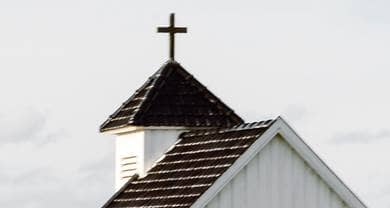- Trending:
- Pope Leo Xiv
- |
- Israel
- |
- Trump
- |
- Social Justice
- |
- Peace
- |
- Love

RELIGION LIBRARY
Methodist
Rites and Ceremonies
The most obvious rite in Methodism, as in most forms of Christianity, is the Sunday worship service. One can break the basic pattern of this service into the following parts:
- Gathering together in the Lord's name. Often there is music (a prelude, for example), and informal and more ritualized forms of greeting.
- Proclamation of the word. This chiefly includes scripture readings (Wesley intended for one chapter of the Old Testament and one chapter of the New Testament to be read each week) and a sermon. There is a very strong tradition in Methodism, rooted in the many famous hymns written by Charles Wesley, of proclamation through hymns.
- People respond with prayers, offerings, commitments to serve each other and the world in God's name, etc.
- Sending out. The congregation is blessed and sent out into the world to further God's ministry.
The weekly services differ somewhat depending on the time in the liturgical calendar. The table or altar typically is covered in white linen, but there are often banners (called paraments) hanging from the table, with different colors to mark the time of the liturgical calendar: white for Christmas and Easter, purple (representative of both penance and royalty) for Advent and Lent, red (marking the fire of the Holy Spirit) for Pentecost, green (seasons after Epiphany and Pentecost).
There are many actions and behaviors that might be considered rites in Christianity in general and in Methodism in particular: praying, hymn singing, communal readings by the congregation, blessings and benedictions; even scripture reading and sermons are highly ritualized. Of these many activities two in Methodism (as in most Protestant denominations) are believed to be actions in which the grace of God is made especially present. These are "sacraments," baptism and the Lord's Supper.
Baptism symbolizes the washing away of sin and membership in the community of the saved. Some Methodist churches practice full immersion baptism, but in most the minister dabs some water from the baptismal font on the forehead of the person being baptized. As the moment of God's forgiveness, it marks the reception of God's justifying grace. Anyone joining the Methodist Church must be baptized. Methodist adults , like many Protestants, practice infant baptism for their own children.
Infant baptism has often been controversial in Protestant churches. It had been practiced by Roman Catholics, in the belief that no one, not even a newborn infant, who died unbaptized, could be admitted into heaven. Protestants stressed God's freedom to save whomever God willed, and thus argued that God could save anyone, baptized or not. Nevertheless, when some argued that because sinners were saved by faith and not works, and therefore had to be old enough to understand concepts like sin and forgiveness to be baptized, Luther and other reformers clung to infant baptism. They believed it was the symbol par excellence that salvation is a free gift of God based on no work or merit whatsoever on the part of the sinner. In this sense everyone is in the same position as the infant: no one is more capable of faith, unless God bestows it. John Wesley and Methodists remain in the mainstream of Protestant practice with infant baptism.
The Lord's Supper (or, Communion or, the Eucharist) has been particularly controversial in Methodism. John Wesley, an Anglican priest, believed that Christ was really present in the bread and the wine used to commemorate Jesus' last supper with his disciples. The Anglican Church doctrine follows that of John Calvin very closely here. The Articles of Religion state that "The body of Christ is given, taken, and eaten in the Supper, only after a heavenly and spiritual manner." Wesley argued that it should be celebrated weekly, though most Methodist churches celebrate it monthly or quarterly.
But the Lord's Supper has often been down played in Methodism because of Methodism's particular historical development. Methodism was spread by itinerant preachers, often not ordained (and therefore not able to bless the bread and wine and perform the Lord's Supper). It emphasized outdoor preaching and revivals in which a rousing sermon played the main role. It reached out to the lower classes and industrial masses often underserved by the Anglican Church. And so the Lord's Supper was often not celebrated, sometimes seemed less important than preaching, and often smacked of being "high church" rather than something with which most people could identify. Some Methodists call the table on which the sacrament is celebrated an "altar," because the ceremony commemorates the sacrifice of Jesus. Others reject the use of the word "altar" because it connotes priests making sacrifices to God, which would make the Lord's Supper a human work. Instead they argue that God needs nothing from humans, and grace flows from God to humans with no regard to human works or merit.
Study Questions:
1. How are Sunday ceremonies structured?
2. What actions are considered Methodist rites?
3. Describe Methodism's understanding of baptism.
4. How has tradition shaped Methodism's understanding of the Lord's Supper?










